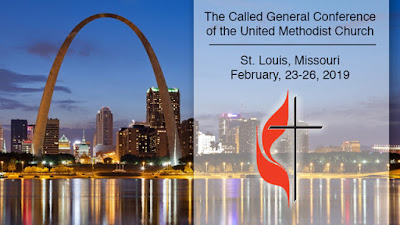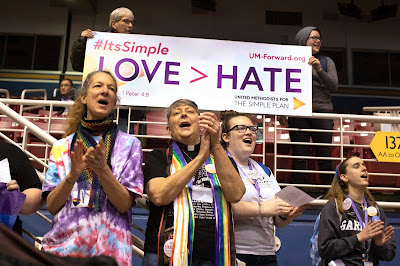Nobody Wins
I don’t mind a healthy debate. Wait…false start. Let me begin again.
I like to argue. I really like to argue when I am passionate about one side in a particular debate or conflict. That isn’t the most appreciated character trait in our coddling, feel-the-love, everybody-wins society. But hey…it’s me. What can I say?
Imagine the self-imposed stress I have been under as I, for the last couple of months or so, have maintained enough restraint to avoid engaging in any discourse regarding the United Methodist Church’s Special Session of the General Conference 2019. For those unaware (likely an overwhelming percentage of the general population) this session was convened in St. Louis in late February with intent to address the Church’s position regarding, among other much less divisive concerns, a couple of current societal and cultural issues.
My refusal to jump in to any discussion—predestined almost certainly to be inflammatory regardless of my personal position—has had absolutely nothing to do with indifference or lack of opinion. No, with four and a half decades of life behind me, I have learned that the only good argument is one with a definite victor. (Yes, by default, this means that there must be a side defeated.) And in this case, no one won. Oh, sure, there were votes cast. One platform garnered more support than the other. But make no mistake. In finality—I use that word with purpose—there was only a loser.
The United Methodist Church.
Now let me offer a disclaimer. I did not attend the conference, but I did do quite a bit of research—yes, it was mostly on the internet, fire at will—regarding the topics at hand. As mentioned earlier, despite some renegade points of interest otherwise, the special session was called to address two glaring subjects of contention within the Church: 1) the ordination of homosexual (as the United Methodist Book of Discipline states, “self-avowed”) clergy and 2) the UMC’s position on the conducting of same-sex marriages by its ministers. A proposal known as the One Church Plan, which essentially would grant independence to the local church to determine its own position regarding these obviously sensitive subjects, was brought forth.
Disclaimer, part 2: I personally believe that the Word of God is very clear on acts of homosexuality, and therefore I remain steadfast in my opposition of the UMC (or any other denomination) condoning or supporting either of these two. Bear with me for just a second as I turn off the paved road.
The real issue at hand is more fundamental than ordination or conducting of marriages. It is a statement on whether or not homosexuality, or rather open practice of homosexuality, is sinful in the eyes of the Church, and by definition, in the eyes of the Lord. Work backwards through the logic: if the Church affirms that it is acceptable to ordain a self-stated gay individual, or alternatively, for a minister of word and sacrament to conduct a marriage between two individuals of the same gender, it is therefore not a sinful practice in either case. You see? Again, in my best mimicking of St. Paul as I separate opinion from fact, let me be clear that my interpretation of scripture is that engaging in acts of homosexuality is counter to the Word of God. (And I am quite certain that about half of the folks who read this will stop right here and head out to their wood sheds to grab torches and pitchforks and look me up on Google.)
Understand that I appreciate that there exists in our basest humanity differing levels of same-sex attraction among, if not every single person, just about everyone. I honestly don’t believe there is much difference in that compared to other desires. Just for argument’s sake—and because it is my blog and I get to exercise my First Amendment rights—let me pursue a parallel for analogy, one that I think most folks would agree on. Say a well-established producer of adult films attends and graduates from a prestigious theological institution and then further pursues ordination in the Church. Said individual, in his interactions with the hierarchy of the Church, states clearly his intention to continue in his native profession of porn production. I doubt seriously that he would gain any position. Carry that same logic with anything sinful, anything that separates us from our God—overindulgence, lust, love of money, you name it. You see where I’m going here? The issue is not the finer points of, “Should we ordain a self-identified practicing lesbian?” or “Should we allow two men to marry with the blessing of the Church?” The question is much more direct: is homosexual practice sinful?
I have digressed way too far. That question and answer, although important in my own estimation and for quite a large proportion of church-goers, is not at all the point of what I write here. Let’s get back off the dirt road.
Fast forward to the climax. Though I do not understand the rules of order for General Conference, and as such I cannot tell you exactly the flow of how the decision was reached, ultimately the One Church Plan was voted down. And though some, perhaps most, would argue that this (the defeat of the Plan) was the culmination of the events, it was not. The true fireworks were just beginning.
If you don’t believe that, all you have to do is spend an hour or so scrolling through Facebook or Twitter or any number of blogs regarding the February 23-26 meeting. I think more love has been shown in MMA fights than might be seen in some of that commentary. By clergy. By laity. By just about anyone.
However, the fact that supporters and dissenters experienced joy or pain, depending on their position, is not unexpected nor necessarily unhealthy. Nor is that alone enough to say that the UMC was the biggest loser in it all. No, what has me so chagrined is the almost universal equating of each position in the debate to a relative “gauge” of that position’s love and acceptance toward a person or group.
And this is what makes me angry.
Having grown up in the United Methodist Church, and having spent most of my married life as a member, I have appreciated so much the “open hearts” mantra. At least in statement, I feel that is completely reflective of the heart of Jesus on earth. In reality, I think my attitude toward walking in His footsteps is summed up on Hard Rock Café t-shirts: love all, serve all.
A long tenure within the UMC also introduced me to a whole host of acquaintances in the pulpit and in laity. They have been friends, mentors, coaches, and critics throughout the better part of my life. And yet, it was so disheartening to read the words of so many of them following the goings-on of General Conference. (Forgive some paraphrasing…some of this is from memory, and some of the paraphrasing is by purpose as I don’t want anyone thinking I am in attack mode against any particular individual.)
“I cannot believe that the Church to which I have dedicated my life and service would vote today in favor of hate.”
“After the vote, I want all my friend in the LGBTQI community to know that, despite the outcome, you are welcome here.”
“Today, the United Methodist Church showed exactly where it draws its line on love.”
“I will do everything in my power to show you all that the defeat of the One Church Plan is not reflective of our congregation’s attitude.”
This makes me mad, really mad, and here’s why. The comments above make a profound point by implication: that the outcome of the Conference vote is a statement of whether or not the Church (or any individual within) loves or does not love a homosexual or transgender or any of the other initials in LGBTQI. Actually what really gets my goat is the implication that I, as an opponent of the two issues on the table, do not or cannot love that same person.
I have stood with my hands lifted high in worship next to addicts, alcoholics, adulterers, and abusers. Sinner though I am, they have done the same next to me. I have been a member of an accountability group with a convicted sex offender. And yes, I have prayed alongside and over gay friends and family, as they have me. To have my love called into question because I disagree with a proposal that I feel is completely counter to the Word makes me have some of my own sinful thoughts, I tell you.
Sadly, as I saw the storm gathering in the months preceding the Special Session, my family and I made the difficult decision to part from membership within the UMC. I could see that in the end, there would be no victory, only vitriol. And I didn’t want our separation to be contingent on whether or not my position of support was favored.
I weep for the United Methodist Church. Actually, I weep for the more universal Christian faith. We are navigating rough waters, and yet we continue to throw ballasts and cargo overboard, thinking that it’ll all calm down. We shout at the waves, we curse the wind. Sound familiar?
I won’t lie and say it is easy to show Christ’s love. More specifically, I won’t say that I have never been lacking in love for a flaw or characteristic or lifestyle with which I disagree. But doggonit, if I am His child, along with every other person roaming this big rock, then we are brothers and sisters. And just like our secular families, we all have our dysfunction. Yet we love each other through it all.
And no vote is going to change that for me.
Tweet


Love this!
ReplyDeleteAmen! This is our thoughts and feelings precisely. Very well stated. I even read comments claiming that the church will now be responsible for the MURDER of thousands of youth because of teenage suicide. I was appalled and deeply saddened to see the leap there. Not once did I hear anyone in opposition of the plan say that they felt like anyone of any group should be unloved or unwelcomed EVER.
ReplyDeleteI read that, too, Stephanie. That is very disturbing.
DeleteThanks for posting this. I think you have summed up how a lot of us are feeling.
ReplyDelete